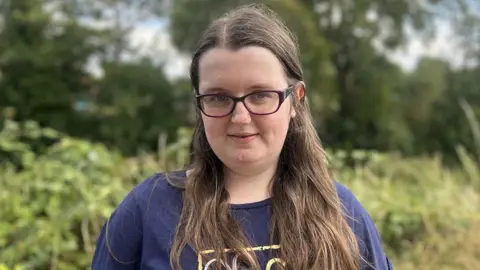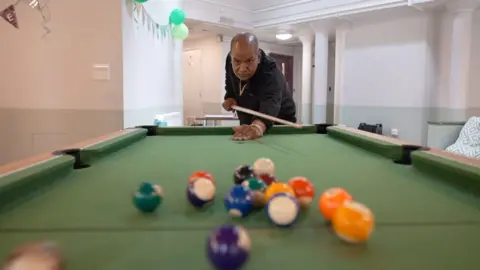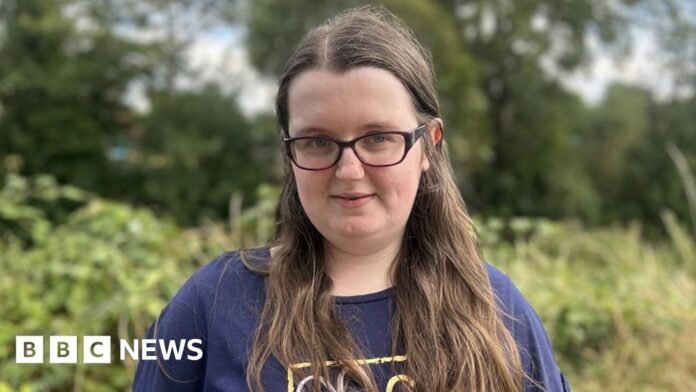 Amy
AmyAs a child, Amy was often violently attacked. At 15, she was threatened with a knife. Now diagnosed with complex PTSD, she’s spent over a decade isolated at home with her mum, desperately seeking help. She has seen a psychiatrist only once.
“I was self harming and felt suicidal and didn’t want to be alive anymore,” says Amy, who’s stuck on the long waiting list for NHS mental health treatment.
She has bounced up and down the list for years despite being known by crisis teams at her local hospital and GP surgery.
Amy is one of thousands of patients across England caught in the backlog of mental health care.
Exclusive analysis for the BBC by charity Rethink Mental Illness reveals a stark – and widening – inequality between mental and physical healthcare. There are 12 times more patients waiting longer than 18 months for treatment compared to those with physical conditions.
Despite four emergency ambulance callouts this year, Amy remains on an indefinite waiting list for severe mental health treatment – with no timeline and no clear path out of crisis.
“I just get told to wait and that services are struggling,” she says. “Sometimes I feel really angry and like screaming and cry all day because I can’t move on with my life.”
Amy finally got onto a college course last year but was asked to leave after a crisis.
“I feel like I’m going round and round in circles and end up in the same situation every single day,” she says. Amy’s mum no longer works, in order to care for her.
Their story reflects the harsh reality behind the statistics: lives unravelling while help remains out of reach.
Mental health gap widening
 SDI Productions/Getty Images
SDI Productions/Getty ImagesWhile the physical health waiting list in England is declining rapidly, the mental health backlog is not coming down rapidly and remains stubbornly high – leaving vulnerable people like Amy stuck and unsupported.
“This is an urgent wake-up call,” says Brian Dow, deputy chief executive of Rethink Mental Illness. “Long delays worsen outcomes. It becomes more expensive to treat them. They end up in secondary care, which is more complex – and they fall further from work and become more reliant on benefits.”
The analysis uses data from NHS England’s monthly statistics. It includes only adults with severe mental illness that have waited more than 78 weeks.
To be included on the waiting list numbers they have to have been referred by community mental health services for further treatment or assessment. Those waiting for talking therapy for mild anxiety or depression are not included in these statistics.
- A list of organisations in the UK offering support and information with some of the issues in this story is available at BBC Action Line.
For the month of May there were 14,586 patients waiting longer than 18 months (78 weeks) for mental health treatment compared to 1,237 people waiting for a physical health operation or appointment.
Dr Becks Fisher of the Nuffield Trust health think tank said the government had made progress on a pledge to recruit 8,500 more mental health workers but added that access for people referred to mental health services “had not been as prominent” in recent planning and guidance as reducing physical health waits.
She said that the share of health spending going towards mental health was set to fall in the financial year ending in April.
In effect that means departmental funding had been favouring physical health services.
“Mental health problems disproportionately affect young people,” adds Mr Dow. “It makes huge health sense and huge economic sense to prioritise mental health access.”
What ‘good’ care looks like
A new mental health hub in East London is offering a radically different approach – described as an example of what “good” mental health care could look like.
Open for walk-in patients without appointments, it provides early intervention in a well-staffed, welcoming space. The effects are already visible – Dr Sheraz Ahmad, a consultant psychiatrist at the centre, says waiting lists have already fallen markedly.
The hub has three consultant psychiatrists and a number of mental health specialists that can offer around-the-clock care. The team here is stable.
“We want to have conversations early on,” explains Dr Ahmad. “Once we understand the problem, we can point people in the right direction – avoiding that vicious circle.”
Here, it’s not just treatment. It’s the continuity of care that helps most. “Having access to the same clinicians that know your story everyday makes a huge difference. It builds trust,” he says.
“I come every day and play pool,” says Moyna, who is living with schizophrenia.
“Sometimes I watch TV, listen to music – and feel better.”
He credits the hub with helping him avoid relapse, and reducing his need for hospital care. He doesn’t need an appointment any more to get support and care in times of crisis, and it is all within his neighbourhood.

The facility is the first of its kind, with short-stay beds. It is only one of six planned by NHS England from Birmingham to Sheffield, York to Cumbria.
The hubs, which are tricky to set up and so are unlikely to be able to be scaled up drastically, unite the voluntary sector and the NHS.
Costs are limited with psychiatrists and infrastructure being the main outlays. Most other staff are volunteers and the east London venue has been provided by a charity.
Despite growing calls for more low-cost, high-impact hubs like these, access to this kind of care remains a distant hope for thousands like Amy.
Shifting care from hospitals to the community
Health Minister Stephen Kinnock acknowledges the reality of mental health care in England: “For far too long people have been let down by the mental health system and that has led to big backlogs.”
He says the government has a plan to tackle the problems.
“We’re seeing more people present with challenges, and the way to deal with that is shifting support from hospitals into the community,” he says.
In mental health care, “it’s all about prevention” adds Mr Kinnock. That’s how he thinks the government can help reduce waiting lists. The gap between mental and physical health waits has grown since Labour came into government.
Last month, when Amy’s mum was discharged after a short hospital stay, she was given a consultant appointment for her physical condition – an undiagnosed heart problem – just a few weeks later. By contrast, Amy continues to wait.
“We don’t know how we’re going to get out of this situation,” she says. “I want to get a job and go to college and things like that. But we’re both just stuck living this life.”





